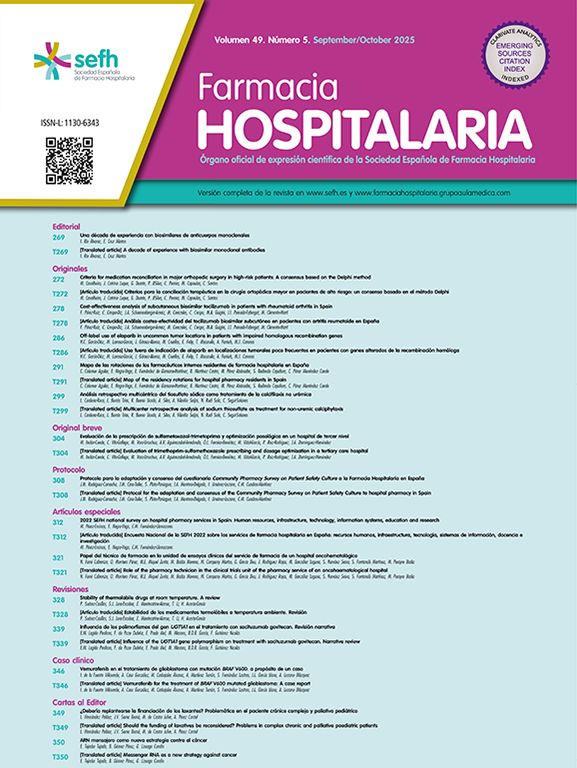Administration of biphosphonates in patients with renal failure requires a dosage adjustment.
ObjectivesAnalyse renal function evolution in multiple myeloma patients after reducing infusion time for 90mg pamidronate by 2h.
MethodsIn 2007, a retrospective study was carried out on all patients who presented multiple myeloma and bone metastasis treated with pamidronate administered every 4h. Following a review of the literature, a protocol for administering pamidronate every 2h was created in partnership with Haematology, and a specific dose reduction framework was established for patients with baseline renal failure. Additionally, a prospective follow-up study of those patients’ renal function was completed to analyse its evolution after the change in infusion time.
ResultsA total of six patients received 90mg pamidronate every 4h. 33.32% of the patients (2/6) presented baseline renal insufficiency, and therefore needed to have the pamidronate dose adjusted according to the new protocol. Subsequently, all of them received the treatment every 2h, and one patient (16.6%) experienced altered renal function after two treatment cycles.
DiscussionReducing administration time for pamidronate from four to 2h did not lead to significant variations in patients’ renal function. This therapeutic practice can improve patients’ quality of life by shortening their hospital stay without aggravating their renal function.
La administración de bifosfonatos requiere un ajuste de dosis en pacientes con insuficiencia renal.
ObjetivosAnalizar la evolución de la función renal tras reducir 2h el tiempo de infusión de pamidronato en pacientes con mieloma múltiple.
MétodosEstudio descriptivo retrospectivo de los pacientes que presentaban mieloma múltiple y metástasis óseas tratados con pamidronato administrado en 4h. Se elaboró un protocolo conjunto con Hematología para administrar pamidronato en 2h, realizándose un seguimiento prospectivo de la función renal de dichos pacientes.
ResultadosUn total de 6 pacientes recibieron pamidronato en 4h. Posteriormente, todos recibieron la administración en 2h, y uno de ellos (16,6%) evidenció alteración de la función renal.
DiscusiónLa reducción en el tiempo de administración de pamidronato no mostró variaciones significativas en la función renal de los pacientes. Esta práctica terapéutica podría mejorar la calidad de vida de los pacientes, al disminuir el tiempo de estancia hospitalaria, sin empeorar su función renal.
Introductory statement: This article was partially published at the V Congreso de la Sociedad Andaluza de Farmacia Hospitalaria, held in Seville on 2008.





